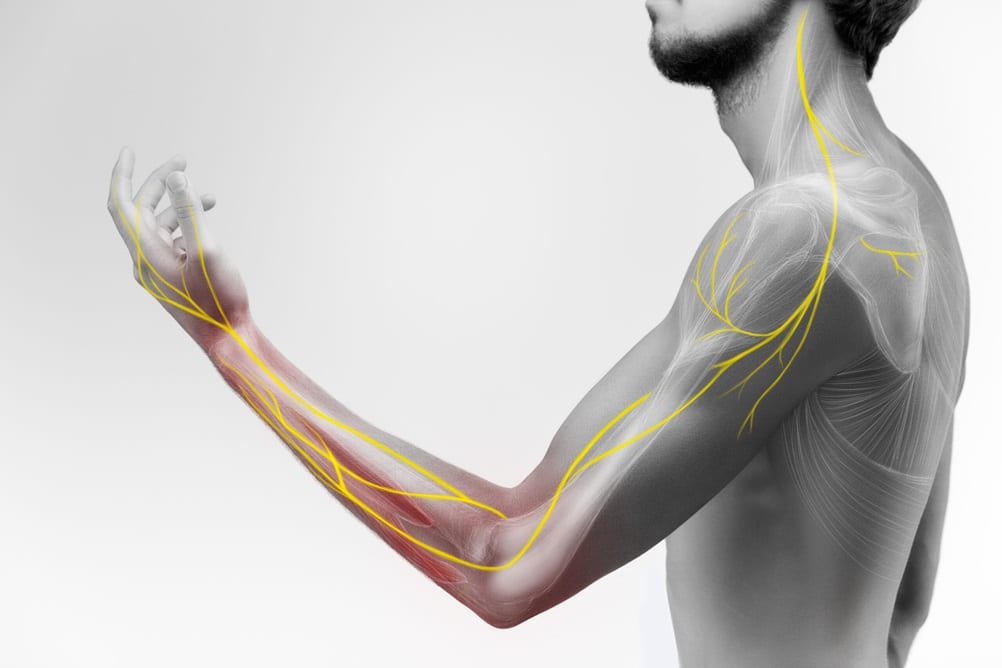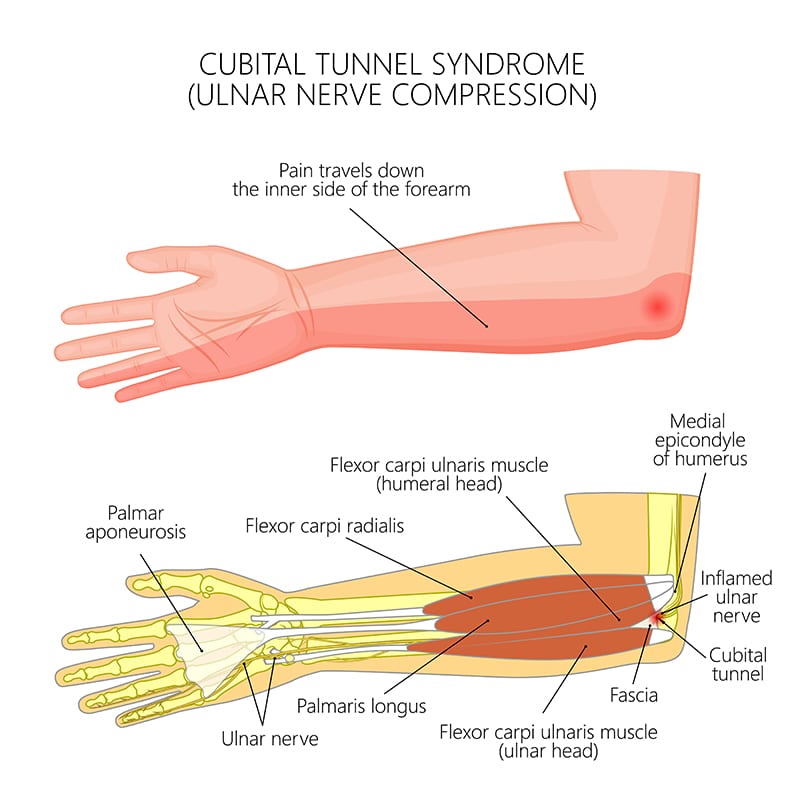This website uses cookies so that we can provide you with the best user experience possible. Cookie information is stored in your browser and performs functions such as recognising you when you return to our website and helping our team to understand which sections of the website you find most interesting and useful.
Cubital Tunnel Syndrome

What Is Cubital Tunnel Syndrome?
Most people have heard of Carpal Tunnel Syndrome, as it’s a chronic condition that affects the nerves in your elbow. Cubital Tunnel Syndrome is a condition that is not as well known.
Cubital Tunnel Syndrome is a condition affecting the ulnar nerve in your elbow – the one most people know as their “funny bone.” It happens when the ulnar nerve, which passes through the cubital tunnel (a tunnel of muscle, ligament, and bone) on the inside of your elbow, is injured and becomes inflamed, swollen, and irritated.
This causes tremendous, uncomfortable pain, similar to hitting your “funny bone” in your elbow. The ulnar nerve begins on the side of your neck and ends in your fingers.
Cubital Tunnel Syndrome
Is the second most common peripheral nerve entrapment syndrome in your body. Symptoms start on the inside of your elbow and sometimes radiate down the forearm to your wrist and ring/pinky fingers.
Many patients who suffer from Cubital Tunnel Syndrome experience repetitive and constant tingling of their elbow, sometimes traveling into other parts of their body like the shoulder – as the ulnar nerve goes to the neck.
One of the most common alerts letting you know it is time to call us. If not treated in time, this constant tingling accompanied by numbness will not heal on its own and can become permanent.
If you are feeling pressure in your elbow that started small and was almost unnoticeable and now has become worse, this too can lead to permanent damage if this condition isn’t treated early.


If you are experiencing cubital tunnel syndrome and need treatment, please contact us at Fair Oaks Orthopedics. Dr. Stephen W. Pournaras and our professional medical staff have excellent knowledge of the complex network of blood vessels, nerves, muscles, ligaments, tendons, and bones that make up your hand and wrist and can help you recover by simply contacting us today.
Frequently Asked Questions About Cubital Tunnel Syndrome
Carpal tunnel syndrome and Cubital tunnel syndrome both cause wrist pain, weakness, numbness, and loss of function in your hands and fingers. They also limit your mobility and prevent you from doing simple things such as driving, typing, or even holding a toothbrush.
Where you are feeling the pain is the difference.
Carpal tunnel syndrome affects your thumb, index, and middle fingers, Cubital tunnel syndrome affects your small and ring fingers. Cubital tunnel syndrome generally causes pain that feels similar to when you hit your funny bone.
Treating either of these conditions can be difficult without knowing which one you’re experiencing. The location of the pain, symptoms, and the treatment depends on your diagnosis.
- Tingling and numbness in your hand, ring and little finger, when you bend your elbow. (Primarily at night)
- Hand, finger and elbow pain
- Weakness in your grip due to muscle injury in the affected arm and hand.
- Aching, shooting pain on the inside of your elbow.
If left untreated, cubital tunnel syndrome can leave permanent nerve damage. You can experience numbness, “pins and needles” or tingling in your arm, elbow, wrist, hand and fingers. Pain that burns or feels like an ice pick in your forearm, that will not go away. This will eventually lead to loss of hand movement.
Before recommending treatment, Dr. Pournaras will conduct an in-depth examination to accurately diagnose your symptoms. He will perform a physical exam and review your medical history. In many cases, he may use additional testing like an X-ray or nerve conduction study.
Once it has been determined that you have cubital tunnel syndrome
The most effective treatment is stopping the activity that is causing the problem. Treatment may include:
Resting affected area
A splint or foam elbow brace worn at night
Using an elbow pad
Nerve gliding exercises
- Ice Packs
- Anti-Inflammatory Medication
The goal of these treatments is to relieve any pressure or inflammation that’s irritating the ulnar nerve.
Cubital tunnel syndrome can happen when a patient bends their elbows often – continuous motion (pulling, reaching, or lifting), leans on their elbow a lot, hits or lands hard on their elbow or has an injury.
Arthritis, bone spurs, and previous breaks, fractures or dislocations of the elbow can also cause cubital tunnel syndrome.
Most of the time, the cause of this condition is unknown.
Cubital tunnel release surgery is performed to relieve pressure or compression on the ulnar nerve as it passes through the cubital tunnel, which is a narrow passageway on the inside of the elbow.
The ulnar nerve is one of the primary nerves in the arm, responsible for providing sensation to the ring and little fingers and controlling some of the muscles in the hand.
Cubital tunnel syndrome occurs when the ulnar nerve becomes compressed or irritated at the elbow. It can lead to symptoms such as numbness, tingling, weakness, or pain in the hand and fingers, especially when the elbow is bent for prolonged periods.
During cubital tunnel release surgery, Dr. Pournaras will make an incision on the inside of your elbow to access the cubital tunnel. He will then release or decompress the structures that are pressing on the ulnar nerve, which may include ligaments, fascia, or other tissues.
In some cases, Dr. Pournaras may also transpose (move) the ulnar nerve to a different position to relieve pressure on the nerve.
The goal of cubital tunnel release surgery is to alleviate symptoms and prevent further damage to the ulnar nerve by allowing it to move freely without being compressed. After the surgery, patients may require a period of rehabilitation and physical therapy to regain strength and function in the affected arm and hand.
Cubital tunnel release surgery is highly recommended for patients who have persistent or severe symptoms of cubital tunnel syndrome that do not improve with non-surgical treatments such as splinting, activity modification, or physical therapy.
Make Your Appointment Today
Fair Oaks Ortho – Fairfax,VA

FAIR OAKS ORTHOPEDICS
Mon 8:00 am – 4:30 pm
Tue 8:00 am – 4:30 pm
Wed 8:00 am – 4:30 pm
Thu 8:00 am – 4:30 pm
Fri 8:00 am – 4:30 pm
Sat Closed
Sun Closed
Get In Touch With Us:
For Information Regarding Workers Comp Accidents or Personal Injury, Please send your requests to Cayla Davidson
[email protected]
Phone: 703-591-0077, her extension is 605.
Cayla is Dr. Pournaras’ admin assistant/surgical coordinator.

